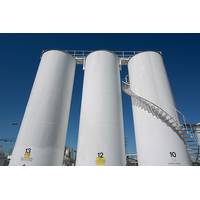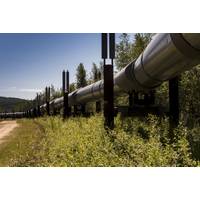US Buyers Turn to Offshore Crude

U.S. sanctions on Venezuela's oil industry have made winners out of Royal Dutch Shell Plc and BP Plc, Gulf of Mexico offshore heavyweights, as refiners in need of substitutes are scooping up oil produced in the region.Those two companies produce notable amounts of crude oil that refiners have settled on as the immediate replacement for the heavy Venezuelan crude that U.S. refiners relied on for years. Trading volumes in these grades of oil have surged to the highest in months, and prices touched five-year peaks after sanctions were imposed.U.S. production has surged to a record 12 million barrels a day, but less than 5 percent of that is heavy oil.
US Judge Halts Keystone XL Oil Pipeline

A U.S. judge in Montana has halted construction of the Keystone XL pipeline designed to carry heavy crude oil from Canada to the United States, drawing a sharp rebuke on Friday from President Donald Trump.The ruling of a U.S. Court in Montana late on Thursday dealt a major setback to TransCanada Corp, whose stock dropped 2 percent in Toronto. Shares of companies that would ship oil on the pipeline also fell.TransCanada said in a statement it remains committed to building the $8 billion, 1,180 mile (1,900 km) pipeline, but it has…
Saudi Arabia Limits US Crude Shipments, Iraq Steps In

Saudi Arabia's efforts to reduce a worldwide crude supply glut by cutting shipments to the United States means others are now filling in, most notably Iraq, in a trend that is set to accelerate in coming months. Over the summer, normally one of the busiest periods for crude shipments, U.S. imports of crude from Iraq rose by 41 percent from a year ago, while similar shipments from Saudi Arabia have dropped by 22 percent. That trend has continued, with ClipperData showing Iraqi shipments to the nation's largest refinery in October surpassed Saudi Arabia's for the first time in more than 30 years.
Demand to Ship Gasoline on Top US Pipeline at 6-yr Low

The operator of the biggest U.S. fuel pipeline system said on Thursday demand to transport gasoline to the country's populous northeast is the weakest in six years, the latest symptom of a global oil market grappling with oversupply. Summer is typically when gasoline demand peaks in the world's biggest oil consuming country as motorists hit the road for vacation, and keeping their gas tanks full strains the capacity of U.S. refiners and pipelines. This year, so much fuel is stored in tanks in the Northeast that Colonial Pipeline…
US Crude Sails to Asia as OPEC Weighs More Cuts

Oil tankers carrying around 10 million barrels of U.S. crude are en route to Asia, according to shipping data and trade sources, as U.S. producers take advantage of favorable prices to ship to the region while OPEC ponders further supply cuts next week. At least eight tankers are in transit, sources said and the shipping data in Thomson Reuters Eikon showed, with one of them carrying the first ever cargo of Southern Green Canyon crude purchased by Japanese refiner Cosmo Energy. Another contains the first Alaskan North Slope cargo to arrive in Asia in eight months.
East Coast Refiners Mull Texas Oil as North Dakota Alternative
U.S. East Coast refiners are looking to buy increasing volumes of domestic crude oil from the Gulf Coast, two sources said, the latest twist in a trade flow upheaval in the wake of the opening of the Dakota Access pipeline. Major U.S. East Coast refiners profited from railing hundreds of thousands of barrels of discounted Bakken crude to their plants daily from 2013 until 2015. But as more and more pipelines were built in North Dakota, the discount began to disappear, and so did the rail cars. Now, at least two East Coast refiners…
As Texas Output Surges, Cash Discounts Soar
Surging West Texas oil production has pushed the value of the region's spot crude to its lowest discount to the U.S. oil benchmark in nearly two years, as an exuberant shale industry pumps more to take advantage of higher prices and demand from refiners who have seen supplies cut by top global producers. OPEC and non-OPEC suppliers are working toward cuts of 1.8 million barrels per day, around 2 percent of the 92 million bpd global market, as they try to bring down record oil inventories and raise prices. But supply cuts by exporters worldwide have given an incentive and opportunity to U.S. shale producers to do the opposite.
U.S. Refiners Cash in on Mexico's Record Imports
U.S. Gulf Coast refiners are cashing in on rising fuel demand from Mexico, shipping record volumes to a southern neighbor that has failed to expand its refining network to supply a fast-growing economy. The fuel trade could top a million barrels per day (bpd) at times in 2017 as Mexico becomes increasingly dependent on the United States for strategic energy supplies and providing business worth more than $15 billion a year to refiners such as Valero, Marathon Petroleum and Citgo Petroleum. The rise in Mexico's fuel imports reflects an economy that…
Dakota Denial Dampens U.S. Pipeline Outlook
The U.S. Army's denial of an easement for the Dakota Access Pipeline, after permitting and legal obligations were followed, sets an uncertain precedent for new projects despite President-elect Donald Trump's promise to support energy infrastructure. The decision came after months of protests by the Standing Rock Sioux tribe and others who said the line could desecrate tribal grounds, or a spill could contaminate drinking water. While most of the 1,172-mile (1,885-km) pipeline is complete, Energy Transfer Partners, the line's owner, needed an easement from the U.S. Army Corps of Engineers (USACE) to drill under Lake Oahe.
Another Quarter of Weak Results Looms for U.S. Refiners
U.S. independent refiners such as PBF Energy and Phillips 66 are expected to report another quarter of disappointing profits in coming weeks, as hopes that a record summer driving season would turn the industry's fortunes around do not appear to have materialized. U.S. refiners are in the midst of their worst year since the shale boom began in 2011. High fuel inventories have punished margins this year, forcing some refiners to voluntarily cut production, delay capital work, lay off workers and slash employee benefits. With margins expected to remain under pressure, relief is not coming anytime soon, analysts say.
As Losses Climb, Colonial Shippers Look to Sell
Some shippers on the largest U.S. refined products pipeline are looking to unload their coveted space after holding onto it has cost them for months, several sources said. Over the last four years, many small companies rushed to win capacity on Colonial pipeline's Line 1 - the main artery that moves gasoline from the U.S. Gulf Coast to the Atlantic Coast - in the hope of building "shipper history," sources at large U.S. refiners said. Shipping history is crucial for companies that want bigger allocations to send fuel through the pipeline. However, since early June, shipping gasoline has become unprofitable due to bloated East Coast inventories.
Enbridge's Sandpiper Prospects Dimming
The long-planned and oft-delayed Sandpiper pipeline through the U.S. Midwest may not be dead, but it appears to be on life support, a likely casualty of the oil-and-gas industry's infrastructure overbuild amid a two-year global oil rout. After years of delays, refiner Marathon Petroleum Corp and midstream giant Enbridge Inc on Tuesday announced they would scrap their joint venture agreements and transportation services for the 450,000 barrels per day Sandpiper project, instead agreeing to acquire a portion of the rival Dakota Access Pipeline.
Bottlenecks Expected as More Canadian Oil Meets Tight Pipe Space
Deeply-discounted prices for heavy crude from the heart of Alberta's oil sands look set to sink further, thanks to hundreds of thousands of barrels of new supply that will have difficulty finding space in crowded pipelines, traders say. It would be another hit for Canada's ailing oil sands producers, who have slashed millions in capital expenditures and been forced to lay off thousands of workers over the two-year downturn in oil prices. Until recently, pipeline space in Alberta has not been an issue as May wildfires took about half of the oil sands' production capacity offline.
Bottlenecks Expected as More Canadian Oil Meets Tight Pipe Space
Deeply discounted prices for heavy crude from the heart of Alberta's oil sands look set to sink further, thanks to hundreds of thousands of barrels of new supply that will have difficulty finding space in crowded pipelines, traders say. It would be another hit for Canada's ailing oil sands producers, who have slashed millions in capital expenditures and been forced to lay off thousands of workers over the two-year downturn in oil prices. Until recently, pipeline space in Alberta has not been an issue as May wildfires took about half of the oil sands' production capacity offline.
U.S. Oil Refiners Look Abroad for Crude Supplies
PBF Energy Inc, one of the largest independent oil refiners in the United States, spent heavily in recent years to build the rail terminals at its Delaware City complex that it needed to take delivery of large loads of crude coming from North Dakota's Bakken oil fields. But now it is considering eliminating those deliveries altogether, and replacing them with foreign crude imports, according to two sources familiar with the situation. It has even closed its small Oklahoma City office that was only opened in 2013 and had served as a hub for the company's trading in North Dakota's oil, the sources said.
High Noon on the Gulf Coast
Canada, Saudi oil set for showdown. As a test of wills between OPEC nations and U.S. shale drillers fuels a global oil market slump, a brewing battle between Canadian and Saudi Arabia heavy crudes for America's Gulf Coast refinery market threatens to drive prices even lower. While the stand-off between the oil cartel and U.S. producers of light, sweet shale oil has captured the limelight in recent months, the clash over heavier grades - playing out in the shadowy, opaque physical market - may put even more pressure on global prices that have halved since mid-2014.
Buckeye Pipeline Quietly Makes Key Acquisition
Houston-based logistic firm Buckeye Partners has spent more than $3.5 billion buying assets since 2010, transforming itself from a quiet regional pipeline utility into an emerging energy powerhouse. But the acquisition that may best symbolize its evolution is one the company didn't tout to investors this summer: a Washington lobbyist. After spending most of the past century pumping fuel from one place to another, the 128-year-old company has become a key player in the import and export of North American oil, with an unrivalled network of East Coast and Caribbean fuel depots and an expanding business loading crude oil from trains to tankers.
Seaway Twin Oil Pipeline Complete
Enterprise Products Partners LP's Seaway Twin pipeline is mechanically complete, but will continue final commissioning through the third quarter, a more prolonged start-up than traders expected. Enterprise said in June that the 450,000-barrel-per-day expansion, which would move crude from Cushing, Oklahoma, to oil tanks near Houston, would be completed except for final testing within the month. The pipeline, which more than doubles the capacity of the Seaway system to 850,000 barrels per day, is mechanically complete from Cushing to the Jones Creek facility, Enterprise said.